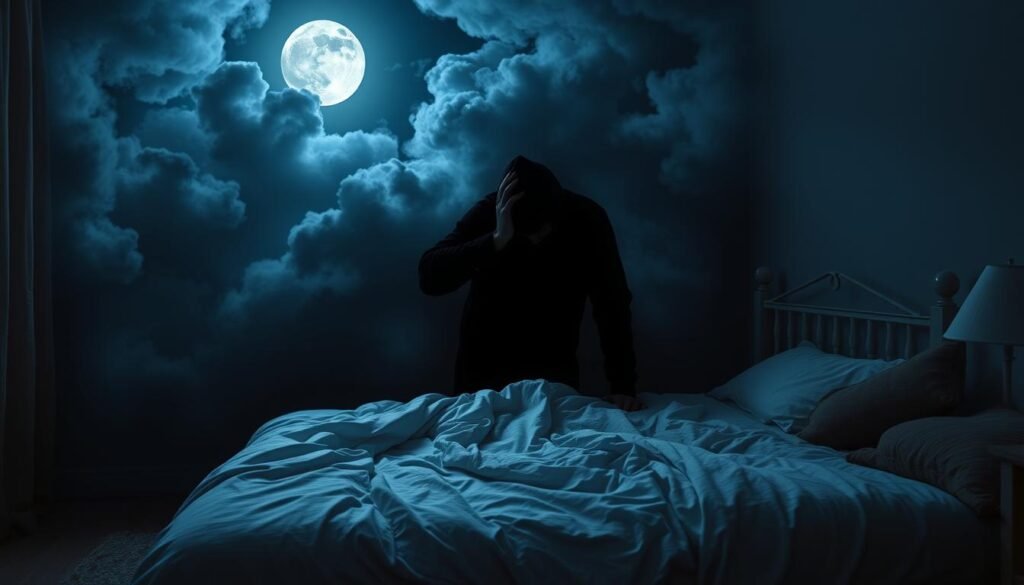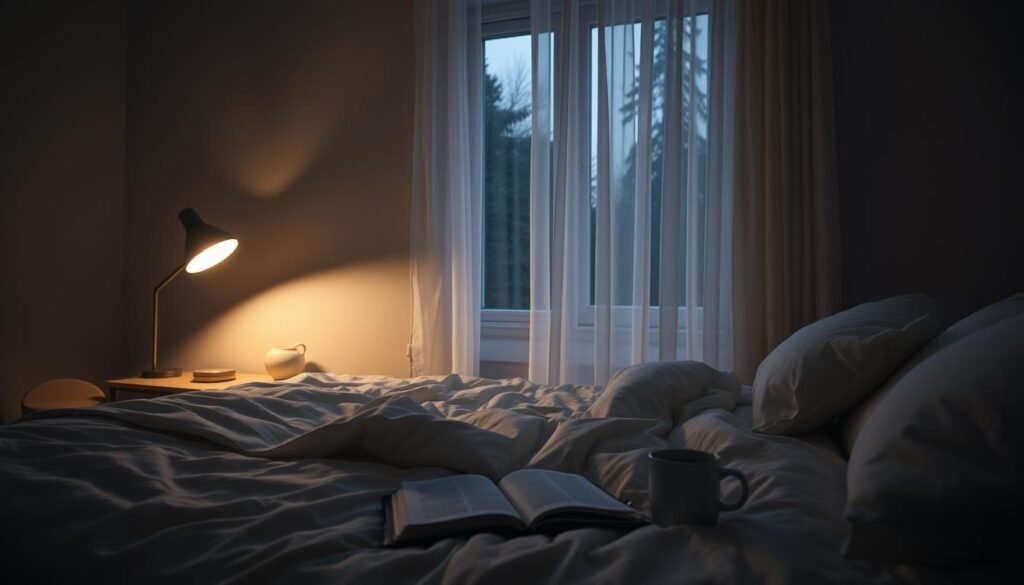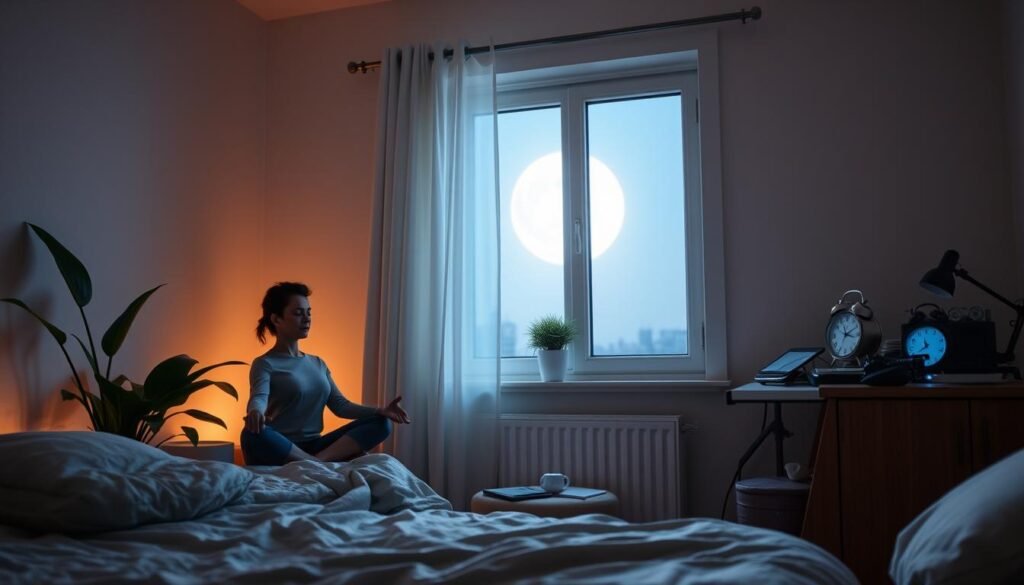Did you know about 70% of people twitch right as they’re falling asleep? These sudden movements, called hypnic jerks, might signal issues like anxiety. This can spoil a good night’s sleep. These twitches can make sleep feel like a battle, full of restlessness and worry.
Anxiety can really mess with sleep quality. It peaks at bedtime, breaking up our sleep, and causing more hypnic jerks. Stress, too much caffeine, and not enough sleep make the twitching worse. By understanding these triggers, people can start to improve their sleep despite the anxiety and twitching.
To sleep better and twitch less, it’s helpful to look at our daily habits and stress control. Making positive changes can lead to the restful sleep we all crave. For tips on managing twitching caused by anxiety, read more at this link: overcoming anxiety and muscle twitching.
Key Takeaways
- Approximately 70% of individuals regularly experience hypnic jerks when falling asleep.
- Anxiety often peaks during the struggle to fall asleep, disrupting sleep patterns.
- Common triggers for muscle twitching include stress, caffeine, and poor sleep hygiene.
- Establishing a calming bedtime routine can help mitigate episodes of twitching.
- Cognitive-behavioral therapy offers effective strategies for managing sleep-related anxiety.
Understanding Hypnic Jerks
Hypnic jerks are a common occurrence during the transition from being awake to sleeping. These involuntary jerks, also known as sleep starts, can surprise us. About 70% of people experience them at some point.
Learning about these jerks can reduce the worry they sometimes bring.
What Are Hypnic Jerks?
Hypnic jerks are sudden movements as someone starts to fall asleep. Adults report them more than children do. Drinking too much caffeine, feeling stressed, or not getting enough sleep can trigger them.
Sometimes, they happen several times quickly, disturbing sleep.
The Sensations Associated with Hypnic Jerks
Experiencing a hypnic jerk can feel like falling or even like vivid dreams. This usually happens right before sleep begins. These sensations make the experience more intense.
Many find these jerks startling, especially those concerned about their sleep quality. But, they’re generally safe and don’t need a doctor’s care.
Causes of Twitching When Falling Asleep Anxiety
Twitching before sleep, known as hypnic jerks, may be caused by our body responding to anxiety. This twitching is linked to how our brain chemicals, or neurotransmitters, work during stress. If we’re stressed, our brain and body might not work well together. This mismatch can cause muscle twitching as we start to sleep. About 70% of people say they feel these twitches often.
Neurotransmitter Activity and Muscle Twitching
Anxiety can make our brain chemicals more active. This might make our muscles twitch randomly. People with a lot of sleep anxiety often have more muscle spasms. Their nervous system is trying to balance itself. Not sleeping enough can make this worse. This can create a loop where anxiety leads to not sleeping well, and not sleeping well leads to more anxiety. Also, certain health issues can make us twitch more. Finding out why this is happening is critical.
External Factors Influencing Anxiety and Twitching
Many outside factors can make these twitches more common. Drinking too much caffeine can stop us from sleeping deeply. This can lead to more muscle twitching. Noisy places, uncomfortable beds, and exercising too much before bed can also cause problems. Knowing what triggers our sleep anxiety and twitches is key to getting better sleep and stopping the twitches.
The Connection Between Anxiety and Sleep
Anxiety greatly affects our sleep quality and patterns. Those with anxiety often have trouble sleeping well. This can make daily life harder. Knowing how anxiety messes with sleep helps us find ways to cope better.
How Anxiety Disrupts Sleep Patterns
Anxiety makes it hard to fall asleep and causes waking up often during the night. Highly anxious people find it difficult to start sleeping peacefully. Thoughts racing at bedtime can cause a pattern of insomnia. This leads to sleep loss and more anxiety. These problems feed into each other, making sleep issues continue.
The Role of Cortisol in Sleep Quality
Cortisol, a hormone, is key in managing sleep and stress. Anxious people have high cortisol levels, harming sleep quality. Stress and anxiety trigger our body’s alarm system. This increases cortisol production. So, sleep is less refreshing, causing more anxiety and muscle twitches at night.

| Factor | Effects on Sleep |
|---|---|
| Anxiety | Increases sleep latency and disrupts sleep cycle |
| Cortisol | Negatively impacts sleep quality and restoration |
| Sleep Deprivation | Exacerbates feelings of anxiety and tension |
| Muscle Twitching | Common in highly anxious individuals due to disrupted sleep |
Understanding the link between anxiety and sleep is key to bettering our mental and sleep health. By addressing these issues together, we might enjoy restful nights again and lessen anxiety.
Strategies for Coping with Sleep Anxiety Twitches
Managing sleep anxiety twitches means finding ways to relax and improve mental health. Stress from our busy lives can make this worse, affecting how well we sleep. Trying steady night routines could ease these issues for better sleep.
Relaxation Techniques to Alleviate Anxiety
Different relaxation methods can help lessen anxiety and the twitches that come with sleep anxiety. These techniques include:
- Meditation: Mindfulness meditation before bed can help calm your thoughts and lower anxiety.
- Deep Breathing: Slow, deep breaths can relax you and lessen anxious feelings.
- Yoga: Doing gentle yoga at night can ease tension and get your body ready for sleep.
Cognitive Behavioral Therapy for Managing Anxiety
Cognitive Behavioral Therapy (CBT) provides structured help for dealing with anxiety. It helps individuals change and control negative thoughts about sleep and anxiety. With the help of a therapist, you can work on:
- Recognizing and changing unreasonable thoughts about sleep and anxiety.
- Finding out what worsens sleep issues.
- Creating strategies to improve sleep and manage anxiety.
| Method | Benefits |
|---|---|
| Meditation | Reduces stress, increases mindfulness. |
| Deep Breathing | Promotes relaxation, eases tension. |
| Yoga | Enhances flexibility, balances mind and body. |
| CBT | Changes negative thought patterns, provides coping strategies. |
Using these methods can help control anxiety and lessen sleep twitches. This can lead to a more peaceful sleep.
Reducing Twitching at Bedtime Anxiety
Getting better sleep is key, especially if you twitch or get anxious at bedtime. Making good sleep habits part of your routine can lessen twitching. This is because these habits make it easier to fall asleep peacefully.
Building a calming routine before bed is important. It helps your mind relax and get ready for sleep. It’s all about improving how well you sleep and finding peace at bedtime.
Improving Sleep Hygiene Practices
Making good sleep habits is important to fight bedtime anxiety and twitching. Key steps include:
- Maintaining a consistent sleep schedule to regulate the body’s internal clock.
- Creating a sleep-friendly environment that is dark, quiet, and cool.
- Limiting caffeine and alcohol intake, especially in the hours leading up to bedtime, as these substances can interfere with sleep quality.
- Engaging in relaxing activities before bed to prepare the mind and body for sleep.
For more advice on sleep habits, check this informative resource.
Creating a Calming Bedtime Routine
Creating a calming routine before bed can really help you relax. What to include in your routine:
- Reading a book or listening to soothing music to signal transition to sleep.
- Taking a warm bath to relax muscles and promote a drowsy state.
- Practicing mindfulness or deep-breathing exercises to alleviate anxiety.
- Limiting screen time to reduce exposure to blue light that can be stimulating.
These steps are great for better sleep hygiene and fighting bedtime anxiety. For more tips on managing nighttime anxiety, see this guide.

Impact of Lifestyle on Anxiety and Twitching
Lifestyle choices affect our mental health and sleep. Things like what we eat and how much we move are important. They help us deal with anxiety and avoid muscle twitching. By knowing this, we can find ways to feel better and sleep well.
Dietary Choices That Affect Sleep Quality
Eating right is key for good sleep and less anxiety. Foods with magnesium, like spinach, nuts, and grains, help our nerves work better. This can reduce twitching from stress. Foods high in omega-3s, like salmon, are great for our minds and sleep. Cutting down on caffeine and sugar also helps with anxiety and sleep.
The Benefits of Regular Exercise for Anxiety Management
Exercise is great for fighting anxiety and sleeping better. Physical activities release endorphins, easing stress. Working out not only cuts down twitching but also helps us relax and sleep better. It’s smart to include regular exercise in our days. But, we should avoid hard workouts right before bed to sleep well.

Understanding the Role of Caffeine
Caffeine wakes up your brain but can make it hard to relax or sleep well. For people who get anxious or twitchy before sleep, it’s crucial to know how caffeine affects them. Knowing when to stop drinking caffeine can improve your sleep a lot.
It’s smart to watch your caffeine use, especially before bed, for a better night’s sleep.
How Caffeine Stimulates the Nervous System
Caffeine keeps you awake by blocking adenosine receptors, which impacts falling asleep. People who drink caffeine may have trouble relaxing and see changes in their sleep cycle. This is even truer for those who feel restless or have sudden muscle movements at night.
Too much caffeine keeps you alert longer, making it harder to fall asleep.
Timing Your Caffeine Consumption for Better Sleep
Knowing when to have caffeine is key for good sleep. Try to have caffeine early in the day only. Drinking it late can mess up your sleep, even causing muscle twitches.
Choosing carefully when to drink caffeine can really help avoid sleep problems.
Importance of a Comfortable Sleep Environment
A cozy sleep environment is key to reducing anxiety and lessening night-time twitching. The right conditions in your bedroom can improve sleep quality and cut down on hypnic jerks. Keeping the bedroom cool, dark, and quiet helps create a restful atmosphere.
Setting the Right Bedroom Conditions
To make your sleep space cozy, you should focus on a few important aspects:
- Temperature: Keep the room at a cool 60-67°F for better sleep.
- Noise Control: White noise machines or soft music can block out annoying sounds.
- Light Management: Using blackout curtains can tell your body it’s time for sleep.
Adding these features to your bedroom can support good sleep and lessen anxiety-induced twitching.
Using Weighted Blankets to Reduce Anxiety
Weighted blankets are becoming popular for easing anxiety and boosting sleep quality. Their gentle pressure feels soothing, which can improve sleep comfort. For those with anxiety, especially at night, weighted blankets can make sleep more serene.
If you want to learn more about solving sleep issues, check out this resource for details on how sleep conditions affect twitching.
Tips for Managing Sleep Anxiety Twitches
Reducing sleep anxiety twitches involves a multi-step plan. This plan includes relaxing your mind and body through different techniques. Making an effort to relax helps your overall health and leads to better sleep. Aim to relax slowly and cut down screen time before bed. This helps create the right conditions for sleeping well.
Gradual Relaxation Techniques Before Sleep
Start using gradual relaxation methods to fight sleep anxiety twitches. Techniques like deep breathing, muscle relaxation, or guided thoughts calm the mind. They get your body ready for sleep. Doing these regularly makes it easier to relax at night.
Limiting Screen Time and Blue Light Exposure
Cutting down on screen time improves sleep. The blue light from devices messes with our sleep cycle. Stop using electronics before bedtime to help your mind relax. Try reading or relaxation exercises instead. These activities create a peaceful sleeping space.
Seeking Professional Help for Twitching and Anxiety
Twitching combined with anxiety can affect life deeply. Knowing when to see a doctor is crucial for symptom control and improving life quality. A doctor consultation for twitching helps find the reasons and create a treatment plan.
When to Consult a Doctor
You should see a doctor when anxiety and twitching affect your day-to-day life. The signs include:
- Frequent, disruptive muscle twitching.
- Inability to focus on daily tasks.
- Significant changes in sleep patterns.
- Heightened feelings of anxiety in daily life.
- Physical symptoms like too much sweating or shaking.
Early help leads to personalized professional treatment options.
Treatment Options for Anxiety-Related Twitching
There are many ways to treat anxiety and twitching. They include:
- Cognitive Behavioral Therapy (CBT) – This therapy teaches how to shift thinking and behavior that cause anxiety.
- Medications – Antidepressants and other medications can help but take time to work.
- Relaxation Techniques – Mindfulness, yoga, and breathing exercises can lower anxiety and relax muscles.
- Support Groups – Talking with people facing similar problems helps in recovery.
Working with a healthcare provider improves management of twitching and anxiety.
Conclusion
Feeling anxious about sleep and twitching is common, but there’s hope. About 60% to 70% of people experience hypnic jerks at some time. Knowing more about this can help. Making changes to improve your sleep can lead to better nights.
Creating a calm bedtime routine can help. So can reducing caffeine and working on sleep hygiene. These actions can make twitching less frequent.
Stress and certain meds can make twitching worse. If sleep troubles continue, getting help from a professional is important. This way, you can find the best approach to ease your sleep anxiety. It leads to better sleep and well-being.
Dealing with sleep twitching takes various steps. By changing your lifestyle and using proven methods, many find relief from sleep anxiety. Achieving peaceful sleep not only is possible but it also improves your life quality.